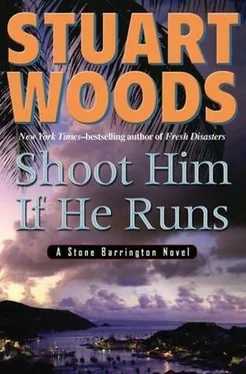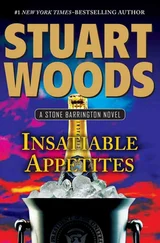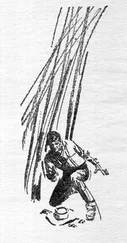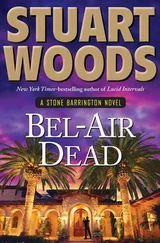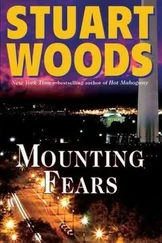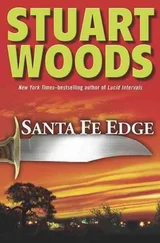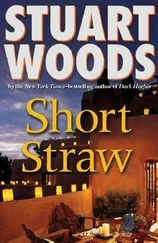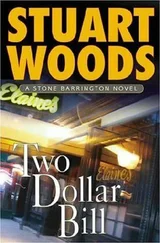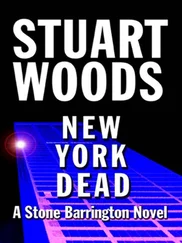“Why?”
“Because of the bugging in the cottage. I don’t want the listeners to hear the satphone ringing or my end of the conversation. What time shall I call you?”
“Around ten o’clock; I’ll know at least something by then. And remember, Holly, the last time Sir Winston got an American woman in his jail, he tried to hang her.”
“Thanks for reminding me,” Holly said drily. “Will you call Ham and find out how Daisy is doing?”
“Holly, the Central Intelligence Agency doesn’t do dog checks.”
“Can I call him on the satphone?”
“Oh, all right.”
“Talk to you tomorrow.” She hung up and called her father in Orchid Beach, Florida.
“This is Barker,” he drawled.
“Hey, Ham.”
“Hey, girl; how’s it going?”
“Pretty well, I guess; tell Ginny I’m enjoying being her. I lost fifteen pounds for the job.”
“That couldn’t hurt.”
“Watch it, Ham. How’s Daisy?”
“Happy as a clam; she goes fishing with me every day and helps by lying down on the foredeck and falling asleep.”
“She’s eating well?”
“You ever know her to turn down a meal?”
“Well, you know, I miss her.”
“By the way, somebody was sniffing around the flight school, asking questions about Ginny.”
“Oh, God, I hope Ginny wasn’t there.”
“She was giving a flying lesson at the time. It was a black guy in a suit and tie, with some sort of accent, and being that dressed up is pretty rare around here.”
“Who’d he talk to?”
“The secretary/bookkeeper in the office. She told him Ginny was out of the country on vacation, like she was supposed to.”
“That’s a relief to hear. We found out our cottage was bugged, and it’s interesting to know that somebody’s checking on us.”
“Well, you watch your ass, girl; I don’t want to have to come down there and bring your corpse home.”
“Relax, Ham; nothing like that going on. I gotta go. You give Daisy a big, wet kiss for me.”
“Yeah, sure. I’ll give Ginny one, instead.”
“Bye.” She hung up and went back out to the beach.
“What’s the word?”
“I’ll call Lance tomorrow at ten for the results of the background check. There’s something else, though.”
“What’s that?”
“A black man in a suit with an accent visited Ginny’s flying school and asked questions about her.”
“Oh, shit.”
“Fortunately, he didn’t see Ginny; she was flying. And the lady in the office gave him the ready story. I hope that satisfied him.”
“So do I,” Stone said. “I hope that’s an end to it.”
Everybody was dressing for dinner, and Stone was ready first. “I’m going to go up to the inn and see what Thomas knows about this Robertson character; I’ll meet you in the bar.”
“Okay,” Holly said, switching on her blow dryer.
Stone slipped into a linen jacket and walked up to the inn. Thomas was behind the bar, in conversation with a customer, a black man in a black suit. A very nice suit, Stone thought, but an odd choice for the tropics.
Thomas waved him over. “Stone, I’d like you to meet one of our more prominent citizens,” he said. “This is Colonel Croft, of our home office. Colonel, this is an old customer, Mr. Stone Barrington, from New York.”
The colonel swiveled on his stool and smiled a broad smile with many teeth. “How do you do, Mr. Barrington?” he said.
He was wearing gold-rimmed dark glasses with reflective lenses, so Stone could not see his eyes, which he found a little disconcerting. “How do you do, Colonel? I didn’t know St. Marks had an army.”
“It’s a police title,” the colonel explained. “Since joining the Home Office I’m no longer a policeman, exactly, but the rank seems to have stuck. Everyone calls me Colonel.”
“I’m a retired policeman myself, like Thomas,” Stone said.
“You look awfully young to be retired,” the colonel replied.
“Medical reasons,” Stone said. “I took a bullet in the knee after fourteen years on the NYPD.”
“And what was your assignment on the force?” the colonel asked.
“I was a detective, mostly investigating homicides.”
The colonel smiled again. “Well, Mr. Barrington, you would have been unable to earn a living in St. Marks; we have so little violent crime and hardly any homicides.”
“You are to be congratulated,” Stone said. “It takes good police work to keep crime at such low levels.”
“We do our best for a small country. I understand you now practice law; in fact, I’ve heard that you have actually practiced in St. Marks, on a previous visit.”
So the colonel knew who he was; Stone was hardly surprised. “I had that honor,” he said, “but quite by happenstance. Your distinguished prime minister bested me handily in court.” Stone thought it best to spread the flattery on thick.
“Yes, your client was hanged, I believe.”
“I’m afraid so.”
“I was chief of police in Markstown at that time,” the colonel said, “so I was not involved in the investigation, but, of course, everyone knew of the incident.”
“Yes, I believe the trial gained some notoriety in the United States as well.” Couldn’t hurt to remind him that treating Americans badly engendered bad publicity. “I hope your tourist trade was not affected.”
“On the contrary,” the colonel said, “the notoriety seemed to give us a shot in the arm, as it were, and our tourist trade has grown steadily since then, benefitting many St. Marksians, as Thomas can readily testify.”
“I can,” Thomas said. “My home island has been very good to me.”
“I hear rumors of a big expansion in tourism to come,” Stone said, “with the arrival of casinos.”
The colonel abruptly stopped smiling. “Oh? And where did you hear that?” he asked, and he seemed genuinely interested in an answer.
“Oh, just gossip on the beach. That couple who went home yesterday said something about it.” The colonel was silent, and Stone felt that his eyes might be boring into him from behind the reflective glasses. “I forget their names.”
“It is best not to repeat gossip, Mr. Barrington,” the colonel said, and it didn’t sound like a suggestion.
“Quite right,” Stone said. “May I buy you a drink, Colonel?”
The colonel looked at his watch. “I’m afraid I have an engagement,” he said. “Perhaps another time.” He stood up.
“I hope so,” Stone said.
“Will you be remaining in St. Marks for very long, Mr. Barrington?”
“Only until the weekend,” Stone said. “So much work waiting back in New York.”
“What a pity,” the colonel replied. “It would have been interesting to get to know you better.”
“Perhaps on some future visit,” Stone said. He offered his hand; the colonel shook it, then departed. When he had gone, Thomas sighed. “Stone, you want to be very careful of what you say to that gentleman.”
“Oh? Did I say something wrong?”
“That business about the casinos is very closely held information.”
“The colonel did give the impression that I wasn’t supposed to know about it.”
“You recovered well, but still…Where on earth did you hear that? Not from me, certainly.”
“Just between you and me, it came up at dinner at Irene Foster’s house.”
“Ah.”
Stone shrugged. As he recalled, it had been Harry Pitts who knew about it, but he didn’t say so. “I visited Leslie Hewitt this afternoon, and I heard about Colonel Croft from him. I was surprised you hadn’t mentioned such an important figure.”
“It was my hope that you could visit St. Marks and depart without encountering the colonel,” Thomas said. “But now that you have, you should avoid further contact with him, if at all possible.”
Читать дальше
